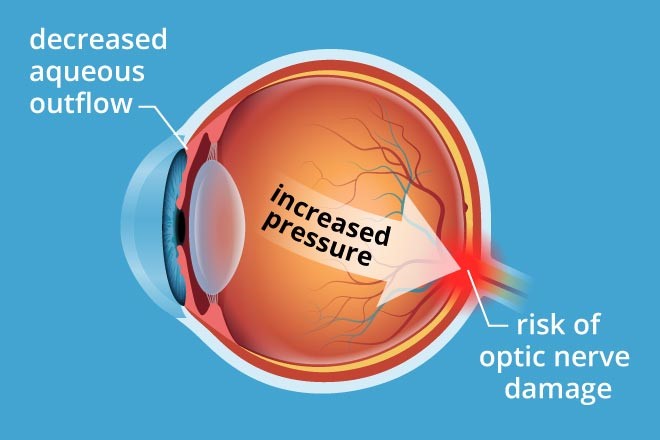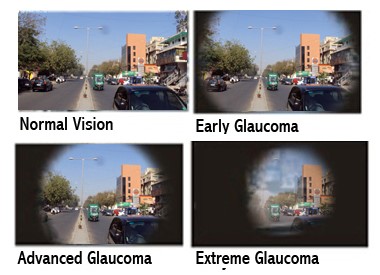Glaucoma is an eye disease that is often associated with elevated intraocular pressure, in which damage to the eye (optic) nerve can lead to loss of vision and even blindness
What is Glaucoma?
Glaucoma is an eye disease that is often associated with elevated intraocular pressure, in which damage to the eye (optic) nerve can lead to loss of vision and even blindness
Glaucoma is a condition of the human eye where the optic nerve gets damaged due to excessive pressure inside your eye resulting in significant loss of vision. Glaucoma generally affects both the eyes, although the pressure inside each eye could be different.
What Causes Glaucoma?
Our eyes constantly produce a clear fluid called aqueous humor (Fig 1 & Fig 2), which bathes and nourishes different regions of the eye (this is different from tears). Normally the fluid drains out of the eye through a 'drainage canal' located in the 'angle' of the eye (Fig 2), the junction between the cornea and the iris. In persons with glaucoma, the fluid does not drain out as freely as it should, thus increasing pressure inside the eye, known as raised intraocular pressure (IOP).
The optic nerve carries all sensations from the retina to the brain. Raised IOP damages the optic disc (that part of the optic nerve that is inside the eye is called the optic disc).


Who is at the Risk of Developing Glaucoma?
- Those above 45 years (the risk increases with age)
- People who have a family history of glaucoma.
- Those who use steroid drops, tablets or ointments.
- Myopia ( near sightedness )
- People with diabetes mellitus, hypertension or who have had eye injuries.
- Anyone with complaints of pain, redness, and watering in the eyes.
- Rainbow colored rings around lights (seeing halos).
- Blurred or foggy vision.
- Loss of side vision.
- Actually, everyone should have a comprehensive eye examination periodically as it can help detect other preventable, controllable,
or treatable diseases such as retinal detachment, diabetic eye disease, and cataract.
How do I know if I have Glaucoma?
Symptoms and Sign
Different types of glaucoma have different symptoms:
1.Open Angle Glaucoma
- Very often there are no symptoms in early stage of disease and hence this form is also known as the silent glaucoma.
- Patients may rarely have headaches or discomfort around the eyes.
- The patient may lose peripheral vision , which usually goes unnoticed.
- As disease progresses, patient eventually is left with only small central "tunnel" vision.
- This occurs more among people above 45 years of age.
2.Angle closure Glaucoma
- Chronic angle closure glaucoma behaves very similar to open angle glaucoma and does not have any symptoms.
- In acute angle closure glaucoma, during an attack of acute glaucoma, patient develops
sudden blurring of vision with severe pain around the eye and throbbing headache.
- He may see rainbow haloes around the light.
- Sometimes nausea and vomiting may be present.
- If not treated quickly and adequately, blindness may ensue.
3.Congenital Glaucoma's
- The child is sensitive to light and tears excessively.
- Eyes appear cloudy and become abnormally large in size.
- Vision is usually very poor.
- It may be associated with other congenital abnormalities in the eye or in the other organs.
- If not treated quickly and adequately, blindness may ensue.
Visual Field Loss in Glaucoma
Visual fiels is gradually reduced in periphery and in last it becomes a tunnel vision.


How is Glaucoma Treated?
OPEN ANGLE GLAUCOMA TREATMENT
MEDICAL TREATMENT
- Initially eye drops are used to lower IOP; your doctor will select the one most suited for your condition. If the disease is advanced, and/or medical treatment fails, surgery may be necessary.
- Medical therapy is likely to be life-long. As with any treatment, there is a risk of side effects. Sometimes the side effects may be more uncomfortable for the patient, and less acceptable. Therefore doctors consider the risk-benefit ratio of the treatment options for glaucoma.
SURGICAL TREATMENT
- In some patients glaucoma may be controlled by medicine alone, while others may need laser treatment or surgery.
- Surgery usually involves cutting a piece of tissue from the angle of the eye and allowing the fluid to accumulate under the transparent skin that surrounds the eyeball. However, glaucoma surgery is not predictable and carries more risks.
- It is usually used if drugs fail to control eye pressure, or for socioeconomic considerations.
- Sometime after surgery the patient may require to continue with anti-glaucoma eye drops.
Need For Constant Care
With any type of glaucoma, periodic examinations are very important to prevent vision loss. Because glaucoma can progress without your knowledge, adjustments to your treatment may be necessary from time to time
FAQ
Whether Glaucoma is a disease that only happens to older people ?
Everyone is at risk for glaucoma from babies to senior citizens. Yes, older people are at a higher risk for glaucoma but babies get glaucoma (approximately 1 out of every 10,000 babies born in this country is born with glaucoma), young adults can also get glaucoma.
Whether symptoms will warn of glaucoma ?
With open angle glaucoma, the more common form, there are virtually no symptoms. There is usually no pain involved with the rise in eye pressure. Loss of vision begins with peripheral or side vision. This type of vision loss can be easily compensated for (by turning the head to the side) and may not be noticed until significant vision is lost. The best way to protect your sight from glaucoma is to be tested so that if you have glaucoma, treatment can begin immediately.
Is Glaucoma curable ?
Glaucoma is not curable, however, it is manageable. But first it must be diagnosed. Often glaucoma can be managed with medication and / or surgery. This means that further loss of vision may be halted. However, glaucoma is a chronic disease that must be treated for life. The best way to tackle this disease is through regular eye check ups.
Does Glaucoma cause blindness ?
Glaucoma is a cause of irreversible blindness, if it is left untreated. In fact it is second most common cause of blindness in India. Fortunately approximately 90% of people with glaucoma who receive proper treatment will able to save further loss of vision.
Is glaucoma inheritable?
Yes, Glaucoma is inheritable. Anyone with a family history of this disease should be doubly cautious.